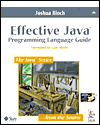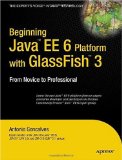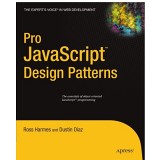 The Pragmatic Craftsman
:: Simplicity from complexity : by Stanley Kubasek ::
The Pragmatic Craftsman
:: Simplicity from complexity : by Stanley Kubasek ::
 The Pragmatic Craftsman
:: Simplicity from complexity : by Stanley Kubasek ::
The Pragmatic Craftsman
:: Simplicity from complexity : by Stanley Kubasek ::

Effective Java (2nd Edition)
by Joshua Bloch
ISBN 0321356683
Date Read 1/2011
My Rating

I read the 1st edition (my recommended book) a few years back. I just re-read the 2nd edition. It’s one of the best Java books around (the other must read would be Java Concurrency in Practice).
Read it.
Re-read it.
The 2nd edition is a little harder to read. Some chapters are too long and are not as cohesive (not like they were in the 1st ed), but still, getting all these tips from a Java champion is very valuable. At the very least, you can use his tips to win your arguments and influence others on your team.
And that’s the reason I’m recommending this book: read it to become a better Java programmer. Isn’t that a good reason? ![]()

Pro JPA 2: Mastering the Java™ Persistence API
by Mike Keith, Merrick Schincario
ISBN 1430219564
Date Read 4/2010
My Rating

If you’re learning or planning to learn JPA 2, you must own this book. Why? It’s the most complete book on the subject out there. It’s like a JPA bible.
Just a warning: It’s not an easy read. You will most likely have to read some (if not all) chapters at least twice. Some even more. For your first read, it will probably feel dry. Only after you learn by doing, by practicing, you will start “getting it.” This was at least my experience. I really started seeing the power of the book after reading selective chapters again. But of course, your experience might be different.
This is your JPA 2 bible. JPA 2 seems easy on the surface. But if you’re doing a project at work and it requires some advanced mapping, for instance, it’s not so trivial. The nice thing about this book is that it covers the advanced topics as well. And it shows you plenty of examples.
Few missing pieces. Cache coverage is light. Not much to it. Sometimes I felt that a full example, rather than a snippet, would be more appropriate. A few times I had to search the internet to get it to work. And as I mentioned before, this book is not an easy read, be prepared.
Excellent job by the authors. Excellent resource on JPA2, which I think is a great ORM spec.
A few years ago, Cedric Beust, had a blog entry with the same title. I saved it. Here’s a summary of what he recommended for staying sharp:
- Reading (a lot of reading) is certainly a great way to accelerate your skills
- Studying other languages is also a fantastic and fascinating way of learning new concepts that change the way you think.
- Spend time with “curious” colleagues.
- Practice. Find the time!
It’s a very good entry. You should take the time now and read it.
How do you stay sharp?
I think it’s safe to say that you are not going to stay sharp by not doing anything. But that, I mean, just going to work and doing what’s required of you. Sure, it can happen, but imagine how much sharper you would be if you did something in addition to that.
To be honest, I don’t know a definite answer on what’s the key to staying sharp. There are different ways that can work for you. Rather than trying to tell you what you should do, I’m just going to explain what I do.
I’ve tried many things over the years. I would say that I’m an aggressive type. I spend a lot of time on learning and improvement. And I’m trying to adjust as I go along.
So, he’re what I do to stay sharp.
Reading. I think reading is critical. I try to read at least an hour every day. Book reading, that is. Sure, there is a lot of good and helpful material/articles on the web that you can read. I do that as well. I have my list of blogs that I read. I find reading them very helpful. It helps me to know the state of things. But reading books requires you to put the effort and spend some quality time with the book. It also means that the author had put some quality time to make the book. This combination means is more valuable than just reading an article.
Over the years, I have changed the way I read books. I have converted to reading most of the books in the PDF/electronic format. I find that much more useful. And easier. I can take notes. I can read the same book at work without actually carrying it to work. Sure, I still buy a hard copy from time to time, but only the select few.
Practicing. Reading will only take you so far. It’s easy to read. I know. I’ve done that for a few years. I was on a roll, reading 300+ pages per month. But I noticed that I am not learning that much. Certainly not as much as I’d like. Plus, the rate at which I started forgetting things concerned me. Why is that? Just reading is not enough. Reading something just once might not be enough as well. I am in the process of modifying this cycle. It looks more like this now: Read. Take notes. Practice. Re-Read. Notes. Practice. Do what works for you. One thing is clear: by reading alone you’re not going to grow. You’ve got to practice. The more the better.
Doing more with less. This is a recent revelation for me. It’s exciting to constantly move to new things. Have you noticed that getting a new book is very exciting? But after you put the book on a shelf and it sits there for a while, something happens. Your interest in that book decreases after a while. It’s not new anymore. Not in your mind. You have discovered something else that’s new. Maybe you got a different book. So you focus shifts, that new thing is more “interesting.” It’s the same with reading. Once I am almost at the end of a book, I’d like to move on to the next. Even writing a review for that book seems tedious. I’d like to start reading a new book right away. But I have to break that cycle. I noticed that this is one of the BIG reasons why I don’t learn as much as I’d like. I’m trying to do too many things. Not good. Here’s what I am trying to do now to break this cycle. Before I move on to the next great thing, I have to make sure that I really learned it. And that means re-reading the book. That means writing a project based on the new information. That means writing a blog entry. That means creating a wiki/learning page. You see: that means doing more with less!
I know that the old way didn’t work for me. It’s something that I had to change. It’s still too early for me to report the results. It’s not easy to adjust. But I believe it’s the right path for me.
Staying sharp is not easy. But if you read a few books a year, you will learn more than most. Steve McConnell is Code Complete says: “One book is more than most programmers read each year (DeMarco and Lister 1999). A little reading goes a long way toward professional advancement. If you read even one good programming book every two months, roughly 35 pages a week, you’ll soon have a firm grasp on the industry and distinguish yourself from nearly everyone around you.” You just have to remember to do something with that knowledge to make it “stick.”

Pro JavaScript Design Patterns
by Ross Harmes, Dustin Diaz
ISBN 159059908X
Date Read 6/2009
My Rating

After reading a few books on JavaScript, I wondered… I wish there was a JavaScript book on Design Patterns. I was very glad when I found this book! It’s an advanced book loaded with great content, interesting style, and practical examples.
2 in 1. Not only do you get a refresher on Design Patterns, but you get to see some advanced JavaScript. It’s a really good combination.
Design Patterns/Javascript combination. This is a design patterns/JavaScript book. That said, you will not really learn JavaScript from it. Similarly, if you want to learn Design Patterns, you are better off going somewhere else. But if you combine these two, and don’t really focus on either one, you get a nice result. That’s exactly what this book is all about: how to implement some GoF patterns in JavaScript.
Design patterns. Which ones? Not all of them, but majority. Looking at the TOC, 12 GoF patterns are covered (Singleton, Factory, Bridge, Composite, Facade, Adapter, Decorator, Flyweight, Proxy, Observer, Command, and Chain of Responsibility). Plus the authors included chapters on Interfaces, Encapsulation, Information Hiding, Inheritance, and Chaining.
Best practices. The authors focus on creating best-practices solutions. I love that. I also love the authors style of code. You get to learn several different styles of creating JavaScript objects. (Could use a bit more explanation about them, but this is not an intro book.) I like to learn from examples, and there are plenty in this book.
Heavy on code examples. Light on explanation. I said it before, the way this book is written makes it suitable for you only if you have a good grasp of JavaScript and GoF Design Patterns. But still, I found this book hard to understand at times. I lost focus a few times. I think the authors could have done a much better job in this regard. The authors briefly explain the pattern and then they give you a long example. A short explanation follows. Very brief. If you don’t understand the full example, you’re out of luck. I would like to see short snippets extracted from the full example and explained. Repeated. So you learn better. And clearer that way.
Plan to re-read. You are most likely not going to “get” this book on your first read. I plan to re-read it. I will take it as an opportunity to deepen my GoF design patterns knowledge. Sort of read two books at once. Sounds like a plan. ![]()
I really liked this book. Design patterns knowledge is very relevant. JavaScript is gaining popularity and getting more advanced. It’s becoming a real programming language. I am still surprised how far it has come. This book is a really good gift to both communities. I highly recommend this book. It’s just the the book I was looking for!
I came across a list of Five books every Java developer must own by Rob Sanheim. I commented on the list. But the list got me thinking. What are the books that I consider the “must have” books? Today’s Javalobby newsletter just added to the fire. I had to create the list. So here it is.
1) Effective Java, Joshua Bloch
A lot of people just code in Java, without being aware of the implications. This book clears out those implications.
2) Code Complete 2, Steve McConnell
This book will make you a better programmer. Enough said. My favorite.
3) Refactoring, Martin Fowler
It is getting a little old, but it contains invaluable information on good design, code smells, and more.
4) Design Patterns, GoF
The best book on patterns, though not an easy one. Might want to get the Head First Design Patterns to help you.
5) Core J2EE Patterns, Deepak Alur, Dan Malks, John Crupi
You have to know GoF patterns if you call yourself a good programmer. You have to know Core J2EE patterns if you want to be a good Java programmer.
6) Agile Software Development: Principles, Patterns, and Practices, Robert Martin
Not an easy book, but a best book on Agile, good Object Oriented programming, and patterns.
7) Applying UML and Patterns, Craig Larman
Java is an Object Oriented language, but a lot of people still treat classes as data structures. Learn what an object, and OO programming is all about.
8) Pragmatic Programmer, Andrew Hunt, David Thomas
Contains sound practices, good advice. It will make you a better programmer.
9) Facts and Fallacies of Software Engineering, Bob Glass
See what works in software engineering, and what doesn’t. Bob Glass explains it best.
10) Don’t Make Me Think, Steve Krug
A great little book, great when you’re involved in UI.
Wait List
I have not read these, and that’s why I have not put them in my original list, but the books below should be on your must-read list.
Peopleware, Tom Demarco, Timothy Lister
Domain Driven Design, Eric Evans
The Timeless Way of Building, Christopher Alexander
Patterns of Enterprise Application Architecture, Martin Fowler
Reference
Five books every Java developer must own, Panasonic Youth blog
Javalobby discussion, my list on the bottomJavalobby Newsletter: archives (great newsletter, btw)